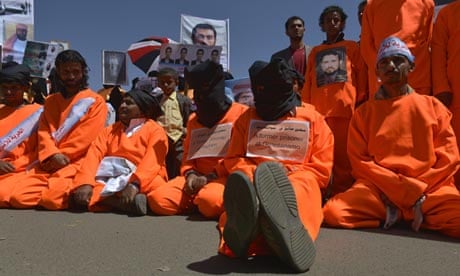Thirteen Guantánamo Bay detainees on hunger strike have written an open letter to their military doctors insisting they receive independent, non-military medical treatment – and appealing to the conscience of their physicians.
"I cannot trust your advice, because you are responsible to your superior military officers who require you to treat me by means unacceptable to me, and you put your duty to them above your duty to me as a doctor," the detainees write in an open letter from the detention center obtained by the Guardian. "Your dual loyalties make trusting you impossible."
The signatories, who include former UK resident Shaker Aamer, protest that the force-feedings administered by military physicians at Guantánamo are "extremely painful" and "in violation of the ethics of your profession." The May 30 letter was co-ordinated by attorneys for the 13 detainees, nine of whom signed the statement directly. Four signed through their lawyers.
Another nine lawyers, some of whom represent Guantánamo detainees, added their names to the letter.
The detainees express an "urgent request" that the Joint Task Force Guantánamo, the military command running the detention facility, allow "independent" doctors selected by their attorneys to treat them. Army Lt Col Todd Breasseale, a Pentagon spokesman, said there is "no precedent" for allowing civilian doctors to treat Guantánamo detainees.
Despite the impassioned tone of the letter, the detainees express "some sympathy" for their military doctors.
"Whether you continue in the military or return to civilian practice, you will have to live with what you have done and not done here at Guantánamo for the rest of your life," they write. "You can make a difference. You can choose to stop actively contributing to the abusive conditions I am currently enduring."
The hunger strike, a high-profile problem for the Obama administration, is approaching its fifth month. Of the 166 detainees at Guantánamo, 103 are refusing food. Thirty-six of them are being forcibly fed through enteral feeds, five of whom are currently being observed in detention camp's hospital. Breasseale said none "currently have any life-threatening conditions."
In April, a Yemeni detainee, Samir Naji al-Hasan Moqbel, published an op-ed in the New York Times describing his "painful, degrading and unnecessary" force-feeding, which involved Guantanamo personnel inserting tubes into nose, stomach and wrist, as well as inserting a catheter into his penis.
The hunger strike galvanized President Obama to return to his unfulfilled pledge to close the detention facility. On May 23, Obama lifted his self-imposed ban on transferring 56 Yemeni detainees who the Defense Department does not consider a threat, citing improved competency by the Yemeni government to hold and monitor them. He also pledged in a high-profile speech to task a new "senior envoy" with repatriating or transferring other detainees cleared for release.
"History will cast a harsh judgment on this aspect of our fight against terrorism, and those of us who fail to end it," Obama said, challenging a Congress that has blocked his efforts to shut the facility. Yet Obama did not rule out future indefinite detention of terror suspects, and designated the Pentagon with finding a "site inside the United States where we can hold military commissions," steps that disappointed civil libertarians.
US officials, including Obama himself, contend that allowing the detainees to die from their hunger strike would be "inhumane."
"We will not allow detainees to harm themselves – not with weapons, not with medication, not via self-imposed starvation to death," Breasseale said. "It's worth noting that not only is our practice the same as the one followed by the US Bureau of Prisons, but the practice of enteral feeding to prevent self-imposed starvation to death has been upheld by multiple US courts."
The detainees do not charge that their military doctors "are bad people," explained Cori Crider, a lawyer from the UK-based human rights organization Reprieve, which helped co-ordinate the open letter. But "they have let themselves be co-opted into force-feeding practices that the world (and the US) medical community judges unethical – practices even Barack Obama has suggested are un-American."
Still, the detainees feel that after years of imprisonment without charge and little sign of Guantánamo's imminent closure, they have little choice besides risking their own deaths to draw attention to their conditions, a situation their letter dares Guantánamo doctors to confront.
"If you truly had my best medical interests at heart," the detainees write to their military physicians, "you could have talked to me like a human being about my choices, instead of treating me in a way that feels like I am being punished for something."

Comments (…)
Sign in or create your Guardian account to join the discussion